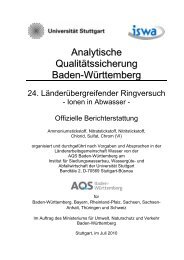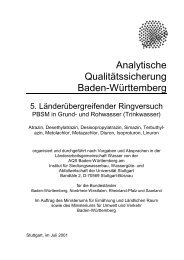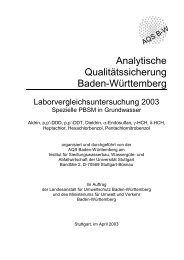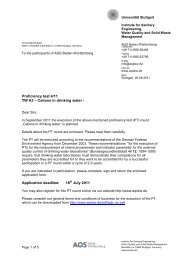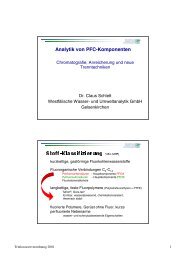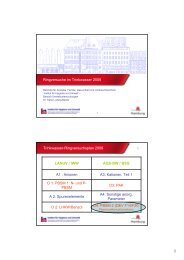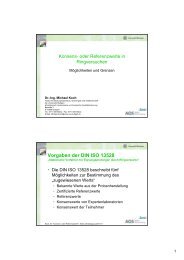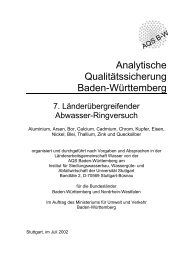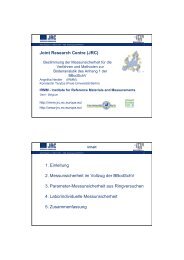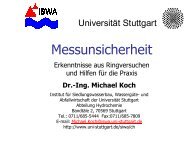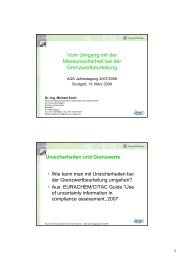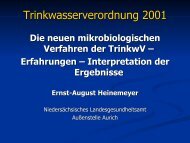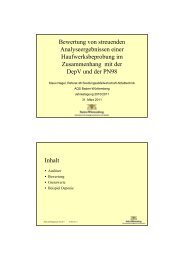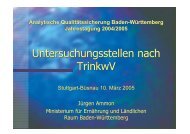Institute for Sanitary Engineering, Water Quality and Solid Waste ...
Institute for Sanitary Engineering, Water Quality and Solid Waste ...
Institute for Sanitary Engineering, Water Quality and Solid Waste ...
Create successful ePaper yourself
Turn your PDF publications into a flip-book with our unique Google optimized e-Paper software.
Industrial <strong>Water</strong> <strong>and</strong> <strong>Waste</strong>water Technology IWT<br />
Figure: JZR pilot plant at the production of the WALA<br />
Heilmittel GmbH<br />
The main operational issues faced during the trial program<br />
were foaming, low membrane flux, <strong>and</strong> mechanical<br />
disruptions. The COD removal efficiency of the<br />
JZR-membrane unit during the ten weeks of efficiency<br />
testing was 88 % (± 6 %). The reduction efficiency of<br />
the oil <strong>and</strong> grease parameter was greater than 99 %;<br />
the permeate concentration was about 3 mg/l, which<br />
was well below the le-gal discharge limit of 300 mg/l.<br />
Zinc <strong>and</strong> copper concentrations tested during the heavy<br />
metal phase were extremely low or not detectable<br />
in the permeate. Most of the heavy metals in the flow<br />
stream were removed via the flotate from the flotation<br />
unit <strong>and</strong> the excess sludge from the JZR. The pilot plant<br />
was found to run effectively at a sludge loading rate<br />
of up to 2.0 g COD/(g TSS • d). The average sludge<br />
growth rate was 0.14 Δg TSS/(g COD eliminated) <strong>for</strong><br />
the testing period.<br />
Client:<br />
WALA Heilmittel GmbH, Bad Boll/Eckwälden<br />
Project Partner:<br />
WEHRLE Umwelt GmbH<br />
Contact Persons:<br />
Prof. Dr.-Ing. Uwe Menzel<br />
Dipl.-Ing. Timo Pittmann<br />
The official inspection office, responsible <strong>for</strong> carrying<br />
out practical tests at different plants to ensure<br />
the reduction of hydrocarbon in wastewater<br />
containing mineral oil.<br />
As a result of Prof. Menzel being appointed part of the<br />
expert-committees<br />
• “Abscheider und Mineralölhaltiges Abwasser -A-<br />
(428)”<br />
• “Mineralölhaltiges Abwasser -B 3-(428c)”<br />
• “Miniralölhaltiges –B 4-(428d)”<br />
by the “Deutsches Institut für Bautechnik (DIBt)” in<br />
Berlin, the <strong>Institute</strong> <strong>for</strong> <strong>Sanitary</strong> <strong>Engineering</strong>, <strong>Water</strong><br />
<strong>Quality</strong> <strong>and</strong> <strong>Solid</strong> <strong>Waste</strong> Management at the University<br />
of Stuttgart (IWT department) was then appointed as<br />
the official inspection office. The department is responsible<br />
<strong>for</strong> carrying out practical tests at different plants<br />
to ensure the reduction of hydrocarbon in wastewater<br />
containing mineral oil.<br />
Client:<br />
Deutsches Institut für Bautechnik (DIBt), Berlin<br />
Contact Persons:<br />
Prof. Dr.-Ing. Uwe Menzel<br />
39



